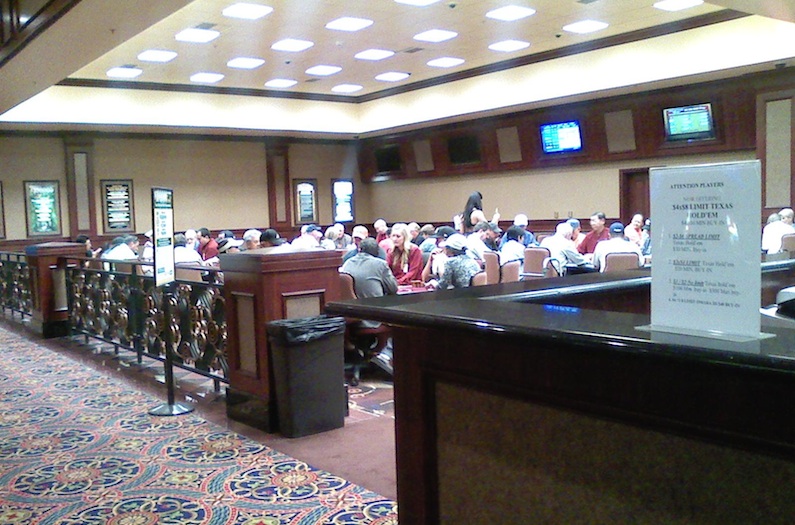Tip Casino Cashier
4/10/2022 admin
Tip Casino Cashier Rating: 7,1/10 1080 reviews
Casino cashiers work in casinos handling money, chips and managing paperwork, which requires mathematical and cash handling abilities. No postsecondary education is required, and training is. A free inside look at Station Casinos salary trends based on 356 salaries wages for 232 jobs at Station Casinos. Salaries posted anonymously by Station Casinos employees. Casino security is required to attend to all money transactions. Officers may be tipped for hopper fills and jackpot payouts according at your discretion (as are the slot attendants). Slot attendants do not normally split their tips with the security officer. Officers are allowed to accept tips and do greatly appreciate them. Here are 16 proven techniques for getting more tips and bigger tips. Sell a Bigger Total Bill. Not surprisingly, the biggest factor affecting tip size was the total size of the bill, Lynn’s research confirmed. That’s why you’ll generally make more waiting tables at an expensive restaurant than at one with lower prices.
Step 1: Understand the job description and responsibilities of a Cage Cashier - Casino
What does a Cage Cashier - Casino do?
A Cage Cashier - Casino handles financial transactions including exchanging cash for casino tokens, performing credit checks, and cashing checks. Accounts for all transactions and balances books to ensure accuracy. Being a Cage Cashier - Casino requires a high school diploma or its equivalent. Typically reports to a supervisor. To be a Cage Cashier - Casino typically requires 1-3 years of related experience. May be entry level if some experience in the skill. Gains or has attained full proficiency in a specific area of discipline. Works under moderate supervision.
People's Opinions on Cage Cashier - Casino responsibilities
A job as a Casino Cage Cashier falls under the broader career category of Gaming Cage Workers.
Is Gaming Cage Worker the right career path for you? Take the MyMajors Quiz and find out if it fits one of your top recommended majors.
All casinos have what is called a cage area that acts as the financial hub for the casino.
It is in this area that most large financial transactions occur, including issuing lines of credit to customers as authorized by credit managers or other casino executives.
Cage cashiers are responsible for recording cash coming into the cage area from a variety of sources or drops.
Read all People's OpinionsSubmit your opinion
Casino change cashiers work in gaming cages changing cash into gaming chips and is the central depositing location for cash at a casino. A casino prefers employees who have money changing experience and these positions require a background investigation.
In this free career guide, you will learn how to have a successful career as a Casino change cashier.
Casino Change Cashier Summary
- Most employers prefer applicants who have at least a high school diploma and experience in handling money or previous casino employment.
- Workers need a license, which requires a background investigation.
- Employment is projected to decline rapidly.
- Jobseekers are expected to face competition.
Working as a Gaming Cage Worker
Gaming cage workers and gaming change persons and booth cashiers work in casinos and other gaming establishments. The “cage” where these workers can be found is the central depository for money, gaming chips, and paperwork necessary to support casino play.
Gaming cage workers and gaming change persons and booth cashiers carry out a wide range of financial transactions and handle any paperwork that may be required. Gaming cage workers, known as cage cashiers, exchange patrons’ chips, tickets, and tokens for cash. Gaming change persons and booth cashiers work in booths and process credit card cash advances and wire transfers and cash checks for patrons. Both cage workers and booth cashiers may sell gambling chips, tokens, or tickets to patrons or to other workers for resale to patrons. Additionally, some cage workers may perform credit checks and verify credit references for people who want to open a house credit account. They may use cash registers, adding machines, or computers to calculate and record transactions. At the end of their shift, cage workers and booth cashiers must balance the books.

Because gaming establishments are closely scrutinized, cage workers and booth cashiers must follow a number of rules and regulations related to their handling of money. For example, they monitor large cash transactions and report these transactions to the Internal Revenue Service to help enforce tax regulations and prevent money laundering. Also, in determining when to extend credit or cash a check, cage workers must follow detailed procedures.
Work environment. The atmosphere in casinos is often considered glamorous. However, casino work also can be physically demanding. The occupation requires workers to stand for long periods, with constant reaching and grabbing for money, chips, and tickets. Sometimes cage workers and booth cashiers may be expected to lift and carry relatively heavy items. The casino atmosphere exposes workers to certain hazards, such as cigarette, cigar, and pipe smoke. Noise from slot machines, gaming tables, and talking workers and patrons may be distracting to some, although workers wear protective headgear in areas where loud machinery is used to count money.
Most casinos are open 24 hours a day, 7 days a week, and offer three staggered shifts. Casinos typically require cage workers to work nights, weekends, and holidays.
Training, Other Qualifications, and Advancement
Although there are no mandatory education requirements, gaming cage workers and gaming change persons and booth cashiers typically receive on-the-job training and are licensed by a regulatory agency, such as a State casino control board or commission.

Education and training. There usually are no minimum educational requirements, although most employers prefer at least a high school diploma or the equivalent.
Casino Cashier Job
Once hired gaming cage workers and gaming change persons and booth cashiers usually receive on-the-job training. Under the guidance of a supervisor or other senior worker, new employees learn company procedures. Some formal classroom training also may be necessary, such as training in specific gaming regulations and procedures.
Licensure. All gaming workers are required to have a license issued by a regulatory agency, such as a State casino control board or commission. Applicants for a license must provide photo identification and pay a fee. Some States may require gaming cage workers to be residents of that State. Age requirements vary by State. The licensing application process also includes a background investigation and drug test.

Other qualifications. Experience in handling money or previous casino employment is preferred. Prospective workers are sometimes required to pass a basic math test, and they must be careful, orderly, and detail oriented in order to avoid making errors and to recognize errors made by others. These workers also should be discreet and trustworthy because they frequently come in contact with confidential material such as a patron’s credit information. Good customer service skills and computer proficiency also are necessary for this occupation. Each casino establishes its own requirements for education, training, and experience.
Advancement. Advancement opportunities in casino gaming depend less on workers’ previous casino duties and titles than on their ability and eagerness to learn new jobs. For example, in addition to advancement opportunities available in the cage, such as promotion to head cage cashier or supervisor, cage workers and booth cashiers may advance onto the floor and become dealers or supervisors.
Employment as a Casino Change Cashier
Gaming cage workers held about 16,900 jobs, and gaming change persons and booth cashiers held about 22,300 jobs, in 2008. All of these individuals work in establishments that offer gaming; employment is concentrated in Nevada, California, Washington, and Mississippi. However, numerous States have legalized gambling, and gaming establishments can now be found in many parts of the country.
Job Outlook
Employment of gaming cage workers and gaming change persons and booth cashiers is projected to decline rapidly through 2018. Jobseekers are expected to face competition because the number of applicants is likely to exceed the number of openings.
Employment change. Employment of gaming cage workers and gaming change persons and booth cashiers is expected to decrease rapidly by about 10 percent between 2008 and 2018. Gaming cage workers and gaming change persons and booth cashiers will experience employment declines as casinos increasingly automate transactions, reducing the amount of cash handled by employees. For example, self-serve cash-out and change machines are common, along with automated teller machines. In addition, most slot machines are now able to make payouts in tickets instead of coins. Tickets can be read by other slot machines and the amount on the ticket transferred to the new machine, or tickets can be read by self-serve machines that allow players to cash out without ever going to the cage. Known as ticket-in, ticket-out game play, these technologies reduce the number of cash transactions needed to play and speed up the exchange process, which means that fewer workers are needed to handle the cage than in the past. In addition, such machines have eliminated the need to have booths and change persons on the slots floor at many casinos. However, many gaming cage workers and gaming change persons and booth cashiers likely will be given opportunities by their employers to transfer to other occupations related to customer service.
Job prospects. Some openings will result from high turnover in these occupations caused by the high level of scrutiny workers receive and the need to be accurate. However, jobseekers are expected to face competition because the number of applicants is likely to exceed the number of openings. People with good mathematics abilities, previous casino experience, some background in accounting or bookkeeping, and good customer service skills should have the best opportunities.

Projections Data
| Occupational Title | SOC Code | Employment, 2008 | Projected Employment, 2018 | Change, 2008-18 | |||
|---|---|---|---|---|---|---|---|
| Number | Percent | ||||||
| Gaming cage workers | — | 39,200 | 35,100 | -4,100 | -10 | ||
| Gaming change persons and booth cashiers | 41-2012 | 22,300 | 20,000 | -2,300 | -10 | ||
| Gaming cage workers | 43-3041 | 16,900 | 15,100 | -1,800 | -10 | ||
| NOTE: Data in this table are rounded. | |||||||
Earnings for Casino Change Cashiers
Wages for gaming cage workers and gaming change persons and booth cashiers vary according to level of experience, training, location, and size of the gaming establishment. Median hourly wages of gaming cage workers were $11.97 in May 2008. The middle 50 percent earned between $10.09 and $14.66 an hour. The lowest 10 percent earned less than $8.66, and the highest 10 percent earned more than $17.35 an hour.
Median hourly wages of gaming change persons and booth cashiers were $10.57 in May 2008. The middle 50 percent earned between $8.60 and $13.11 an hour. The lowest 10 percent earned less than $7.48, and the highest 10 percent earned more than $15.41 an hour.